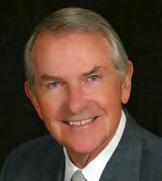
A publication of the Arkansas Bar Association


A publication of the Arkansas Bar Association

PUBLISHER
Arkansas Bar Association
Phone: (501) 375-4606
www.arkbar.com
EDITOR
Anna K. Hubbard
EXECUTIVE DIRECTOR
Karen K. Hutchins
PROOFREADER
Cathy Underwood
EDITORIAL BOARD
Caroline R. Boch
William Taylor Farr
Anton L. Janik, Jr.
Jim L. Julian
Tory Hodges Lewis
Drake Mann
Tyler D. Mlakar, Chair
Michael A. Thompson
Brett D. Watson
Amie Schoeppel Wilcox
David H. Williams
Nicole M. Winters
OFFICERS
President
Kristin L. Pawlik
President-Elect
Jamie Huffman Jones
Immediate Past President
Judge Margaret Dobson
President-Elect Designee
Representative Carol Dalby
Secretary
Glen Hoggard
Treasurer
Brant Perkins
Parliamentarian
Brent J. Eubanks
YLS Chair
Frank LaPorte-Jenner
BAR ASSOCIATION STAFF
Executive Director
Karen K. Hutchins
Director of Operations
Kristen Frye
Finance Administrator/CPA
Staci Clark
Publications Director
Anna K. Hubbard
Executive Administrative Assistant
Michele Glasgow
Office & Data Administrator
Cynthia Barnes
Professional Development Coordinator
Lisa McCormick
Information Technology Specialist
Rachel Henderson
Perspectives: Why Trial Lawyers Need Appellate Lawyer Perspectives By Judge Cindy Thyer
an Attorney Should Know Before Practicing Before the Arkansas Supreme Court
Appellate Law Clerks Wish Lawyers Knew By Martha Ayres
Observations About Contempt and Appellate Jurisdiction By Judge Brandon J. Harrison and Amber Davis
Got 20 Minutes—Make Them Count: Why Oral Argument Still Matters on Appeal
Judges—A Horse of a Different Color
Exactly is a Magistrate Judge? By Judge Joe Volpe
First Principle of Effective Advocacy By Judge Leon Holmes

from Arkansas judges in ArkBar’s View from the Bench video series.
at: arkbar.com/resources/ view-from-bench-videos
The Arkansas Lawyer (USPS 546-040) is published quarterly by the Arkansas Bar Association. Periodicals postage paid at Little Rock, Arkansas. POSTMASTER: send address changes to The Arkansas Lawyer, 1401 W. Capitol Ave., Suite 170, Little Rock, Arkansas 72201. Subscription price to nonmembers of the Arkansas Bar Association $35.00 per year. Any opinion expressed herein is that of the author, and not necessarily that of the Arkansas Bar Association or The Arkansas Lawyer. Contributions to The Arkansas Lawyer are welcome and should be sent to Anna Hubbard, Editor, ahubbard@arkbar. com. All inquiries regarding advertising should be sent to Editor, The Arkansas Lawyer, at the above address. Copyright 2025, Arkansas Bar Association. All rights reserved.
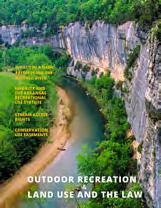

Advertise in the next issue of The Arkansas Lawyer magazine
President: Kristin L. Pawlik; President-Elect: Jamie Huffman Jones; Immediate Past President: Judge Margaret Dobson President-Elect Designee: Carol Dalby; Secretary: Glen Hoggard; Treasurer: Brant Perkins Parliamentarian: Brent J. Eubanks; YLS Chair: Frank LaPorte-Jenner
Trustees:
District A1: Elizabeth Esparza, Geoff Hamby, William M. Prettyman, Lindsey C. Vechik
District A2-A3: Matthew Benson, Evelyn E. Brooks, Jason M. Hatfield, Christopher M. Hussein, Michelle Rene’ Jaskolski, Sarah C. Jewell, George Rozzell, Russell B. Winburn
District A4: Kelsey K. Bardwell, Craig L. Cook, Brinkley B. Cook-Campbell, Dusti Standridge
District B: Randall L. Bynum, Mark Kelly Cameron, Thomas M. Carpenter, Tim J. Cullen, Bob Edwards, John A. Ellis, Bobby Forrest, Michael K. Goswami, Steven P. Harrelson, Michael M. Harrison, Jim Jackson, Anton L. Janik, Jr., Victoria Leigh, Skye Martin, Kathleen M. McDonald, J. Cliff McKinney II, Jeremy M. McNabb, Molly M. McNulty, Meredith S. Moore, John Ogles, Casey Rockwell, Lauren Spencer, Aaron L. Squyres, Caitlin Campbell Stepina, Jessica Virden Mallett, Danyelle J. Walker, Patrick D. Wilson, George R. Wise
District C5: William A. Arnold, Joe A. Denton, John T. Henderson, Brett D. Watson
District C6: Bryce Cook, Paul N. Ford, Jeffrey W. Puryear, Paul D. Waddell
District C7: Kandice A. Bell, Robert G. Bridewell, Sterling T. Chaney, Taylor A. King
Delegate District C8: Amy Freedman, Connie L. Grace, John S. Stobaugh, Josh Thane
Ex-officio Members: Judge David McCormick, Judge Chaney W. Taylor, Vicki S. Vasser, Dean Cynthia Nance, Dean Colin Crawford, Denise Reid Hoggard, Eddie H. Walker, Jr., Christopher M. Hussein, Karen K. Hutchins Board of Trustees

Har-Ber High School Wins State Mock Trial Championship and Places in Top 10 Nationally

Har-Ber High School earned first place at the 2025 Arkansas High School Mock Trial Championship and went on to represent Arkansas at the National High School Mock Trial Championship, where they placed ninth out of 48 teams from across the country. Their performance reflects the strength of Arkansas’s mock trial programs and the hard work of students, teachers, and coaches statewide.
The state championship took place on March 1 and concluded with a final round between Har-Ber High and Fayetteville High School. U.S. District Judge James M. Moody, Jr., presided over the final round, with a panel of scoring judges that included Arkansas Bar Association President Kristin Pawlik, President-Elect Jamie Jones, Jonathan Ross, Lisa Peters, and Adam Jackson.
Following their state win, Har-Ber High traveled to Phoenix, Arizona, for the national competition, held May 8–10. In addition to the team’s top-10 finish, Aaron Oesterle received one of only 10 Outstanding Witness Awards presented at the national level.
“This was an impressive showing by Har-Ber High,” said Anthony McMullen, Past Chair of the Arkansas Mock Trial Committee. “Their preparation and teamwork were evident throughout the competition.”
This year’s Arkansas competition included 26 teams, one of the largest in recent memory, reflecting growing interest in mock trial programs across the state.
The Arkansas Bar Association and the Arkansas Mock Trial Committee thank the many volunteers, including judges, attorneys, law students, and educators, who supported the program. Special thanks to the Eastern District of Arkansas, the University of Arkansas School of Law, the UA Little Rock Bowen School of Law, and the Arkansas Bar Foundation for their continued support.
Congratulations to Har-Ber High School on their accomplishments and to all teams who participated in this year’s program.
Mock Trial Committee
Margaret King Davis, Chair
Adam D. Jackson, Vice Chair
Beverly I. Brister
Robert S. Coleman, Jr.
Daniel A. Curtis
Brooke Jackson Gasaway
Sarah E. Greenwood
Adrienne Morris Griffis
Michael McCarty Harrison
Michael B. Heister
Johnathan D. Horton
Lori D. Howard
Christopher M. Hussein
Ryan W. Lazenby
Melanie Ann Maddox
Gabriel D. Mallard
William C. Mann, III
Richard Bryant Marshall
Andrea Davis McCurdy
Hon. Mary Spencer McGowan
Anthony L. McMullen
Barrett S. Moore
Theresa Ann Morris
Ashley Elizabeth Norman
Kristin L. Pawlik
Constance Brown Phillips
Natalie Elizabeth Ramm
Kristin Riggan
Elizabeth May Rogers
Jordan Brown Tinsley
Timothy F. Watson, Jr.
Brittany Webb
Nicole Marie Winters
Volunteers
Josh Ashley
Joshua Baxter
Kandice Bell
Steven Benson
Nathan Bogart
Skylar Burton
Brian Clary
Robert Coleman
Elijah Conley
Casey Copeland
Ellen Court
Dean Colin Crawford
Cory Crawford
Conner Cullen
Jason Davis
Cass DeCoursey
Lana Fraser
Judge Butch Hale
Joanie Harp
Judge Tricia Harris
Tyler Henderson
Glen Hoggard
Lauren Hoover
Nick Hornung
Emma Jumper
Ross King
Traci LaCerra
Dana Landrum
Julie Linck
Hannah Malone
Eliza Meredith
Judge Jay Moody
Barrett Moore
Judge Benecia Moore
Theresa Morris
Jace Motley
Evan Nelson
Abigail Obana
Paige Oliver
Chandler Perry
Taylor Pray
Scott Provencher
Scott Richardson
Marjorie Rogers
Lexie Rook
Jillian Schurr
Deanna Siria
Stephanie Smith
Kathleen Talbott
Judge Rick Taylor
Trent Thomas
Courtney Umeda
Judge Joe Volpe
Karen Wallace
Laura Westbrook
Vito Whitmore
Debra Williams
Amanda Williamson
Monica Woolems

Thomas G. Williams, a Managing Member of Quattlebaum, Grooms & Tull PLLC, was inducted as a Fellow of the American College of Trial Lawyers. The following faculty members from the UA Little Rock William H. Bowen School of Law have been selected for the 2025 Faculty Excellence Awards: Theresa Beiner, John Cook, Beth Levi, Alicia Mitchell, and Rob Steinbuch. Chad Cumming received the Professional Mentor of the Year award at the annual Bowen Awards.
Molly McNulty has been named the director of development and external relations at the UA Little Rock William H. Bowen School of Law. Kutak Rock announced that Matthew Boch has joined the firm’s Little Rock office as a transition partner in the Tax Group and that Blake Lewis joined the firm’s Real Estate and Commercial Transactions group. Quattlebaum, Grooms & Tull PLLC announced that Sarah L. Holden has joined the firm as a litigation associate in the firm’s Little Rock office.
Send your oyez to ahubbard@arkbar.com
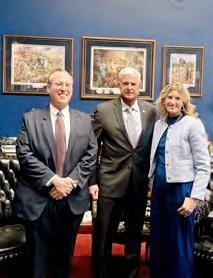
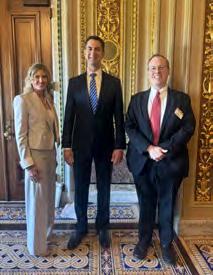

ArkBar President Kristin L. Pawlik and Board of Trustees member Cliff McKinney recently visited Washington D.C., where they met with Senator Tom Cotton and Representative Steve Womack as part of efforts to advocate for Access to Justice.

Karen K. Hutchins Celebrates 20 Years of Leadership with the Arkansas Bar Association

Karen K. Hutchins, Executive Director of the Arkansas Bar Association, recently celebrated 20 years of service to the Association. Throughout her tenure, Karen has led ArkBar through transformative changes, helping modernize operations, strengthen member engagement, and navigate extraordinary challenges.
In recent years, Karen has worked closely with the Finance Committee, Executive Committee, and Board of Trustees to implement strategies that streamline operations and strengthen the Association’s long-term sustainability. Her leadership has included overseeing a major office move from the Arkansas Bar Center to the Victory Building in downtown Little Rock in December 2024. She continues to guide the Association toward future improvements, including upcoming advancements in member service and technology.
Karen’s contributions extend beyond ArkBar. She has served as President of both the National Association of Bar Executives and the Arkansas Society of Association Executives and holds the Certified Association Executive (CAE) credential.
“Karen’s dedication, innovation, and steady leadership have left a lasting impact on the Arkansas Bar Association and the legal community it serves. Peers from across the country recognize her as a model of excellence in the field. We are grateful for her vision and commitment to our state,” said Association President Kristin Pawlik. “Congratulations to Karen on this remarkable milestone!”
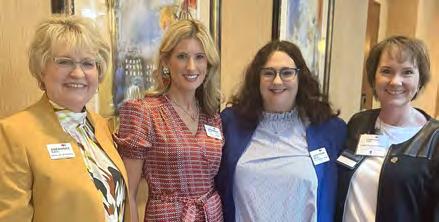
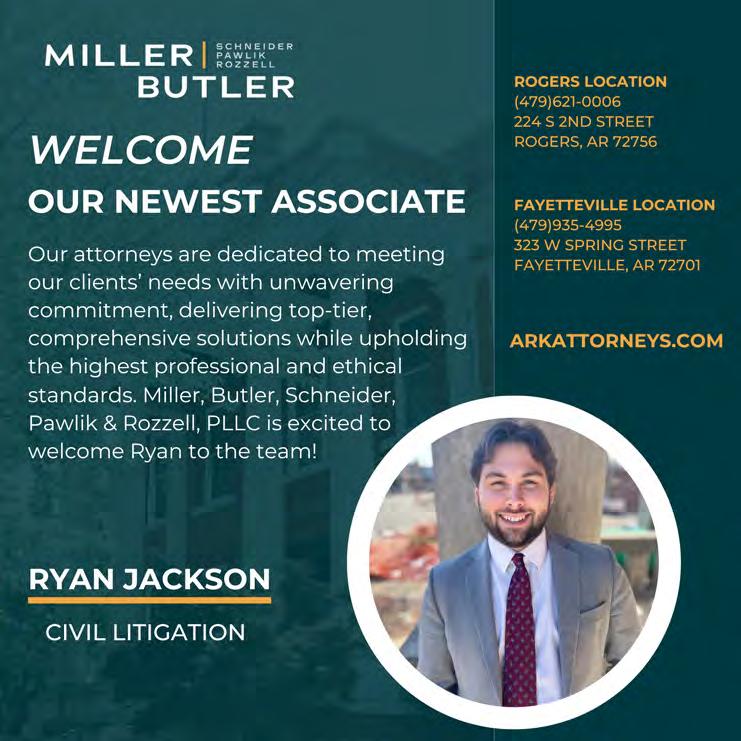


Kristin Pawlik is the President of the Arkansas Bar Association. She is a partner at Miller, Butler, Schneider, Pawlik & Rozzell, PLLC in Northwest Arkansas.
The Mission of the Arkansas Bar Association is to support attorneys; advance the practice of law; advocate for the legal profession; foster professionalism, civility, and integrity; and protect the rule of law.
It is our mission to protect the Rule of Law. Throughout my 15 plus years of involvement in the Arkansas Bar Association, I have witnessed as we stepped out to confront challenges to the profession; to fight for the independence of the judiciary, to push back against overreach into the rulemaking authority of the Courts, and to defend against campaign attacks on attorneys and judges from dark money sources. ArkBar exists to meet these tests to our profession. Practicing law, we have the privilege of shrouding ourselves in the Rule of Law, relying on the certainty that its precepts are superior, just, and enforceable. But to truly protect this precious thing, we have to be able to explain it to those who do not experience the same privilege as us; we must explain it to those who do not practice law, and we have to make it tangible. Engage your families, friends, and neighbors, to share with them why it is crucial that we remind those in government that they are servants of the people, in a nation of laws.
I urge you to unite under our mission. ArkBar is the only statewide organization of lawyers committed to protect this idea that is the Rule of Law. The oaths we took affirm that the Rule of Law is superior to the rule of any one leader, no matter how great the margin of victory or how popular the personality. Lawyers cannot remain silent while government leaders deride this core principle. We cannot simply shrug our shoulders and sit this one out. To do so would be to fail our oath.
Not all of our members agree that this is a time for action. Some believe that opining on principle in this instance equates to ArkBar taking a political stance. Other members are impatient for the Association to take a
position. And those Arkansas lawyers whose practice area has been targeted by Executive Order may feel that ArkBar cannot take a stand soon enough. These differences are not easy to resolve, but the discussion is critical. It is critical because the myth that is the Rule of Law only exists so long as the collective belief in its power does. And that is all it is—an idea, a myth; an idea so powerful that the Founding Fathers, most of whom were lawyers, founded a nation upon it. It will last only as long as the citizenry believes it. Once people stop buying in, it will cease to exist. We have to remind our friends and family that the Rule of Law makes possible enforceable contracts, marketable title, legal tender, interstate compacts and basic law and order.
Under the definition listed in the sidebar, the Rule of Law dictates that everyone, regardless of title or status, is bound by the same set of laws applied equally across the board. Put another way, the Rule of Law stands for the proposition that no one is above the law. Our country’s most fundamental law is the Constitution.
As attorneys, we vowed to support the Constitution of the United States, as did each officer of the U.S. government; members of Congress, state legislators, federal judges, and the President pledged first and foremost to uphold the Constitution. To uphold means to speak up when we see it being mocked, or disregarded, or threatened.
Lawyers are stewards of justice, advocates for the rule of law, and guardians of the principles that underpin our democratic society, we should look for opportunities to educate the public about the vital role of the judiciary in maintaining the balance of power and protecting individual rights.

What exactly is the Rule of Law?
Many have written about it, but Justice Kennedy once observed: “The term Rule of Law is often invoked yet seldom defined.”1
According to the Administrative Office of the U.S. Courts:
The rule of law is the principle whereby all members of a society (including those in government) are considered equally subject to publicly disclosed legal codes and processes.
The rule of law implies that every person is subject to the law, including people who are lawmakers, law enforcement officials, and judges. Under the rule of law all persons, institutions, and entities are accountable to laws that are:
• Publicly promulgated
• Equally enforced
• Independently adjudicated
• Consistent with international human rights principles.2
Endnotes:
1. Anthony M. Kennedy, Assoc. Justice, U.S. Supreme Court, Address at the 20th Sultan Azlan Shah Law Lecture: Written Constitutions and the Common Law Tradition (Aug. 10, 2006) (transcript available at http://www.sultanazlanshah.com/ pdf/2011%20Book /SAS_Lecture_20.pdf [https://perma.cc/6TK8-PZRU]) (“Although I cannot recall hearing the phrase in common usage when attending college and law school a half century ago, it has deep roots.”).
2. https://www.uscourts.gov/educationalresources/educational-activities/rule-law. ■



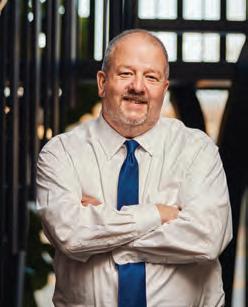
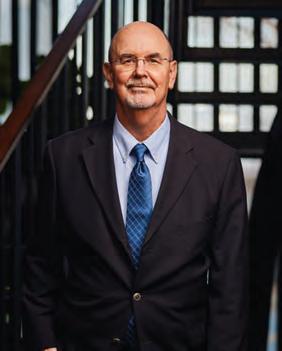
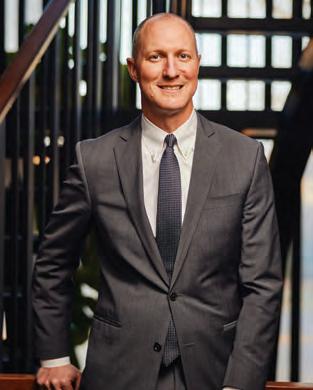
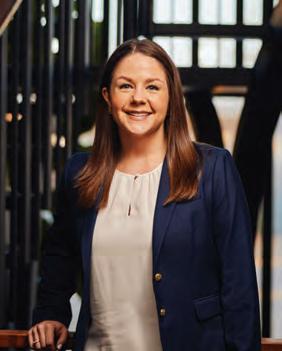
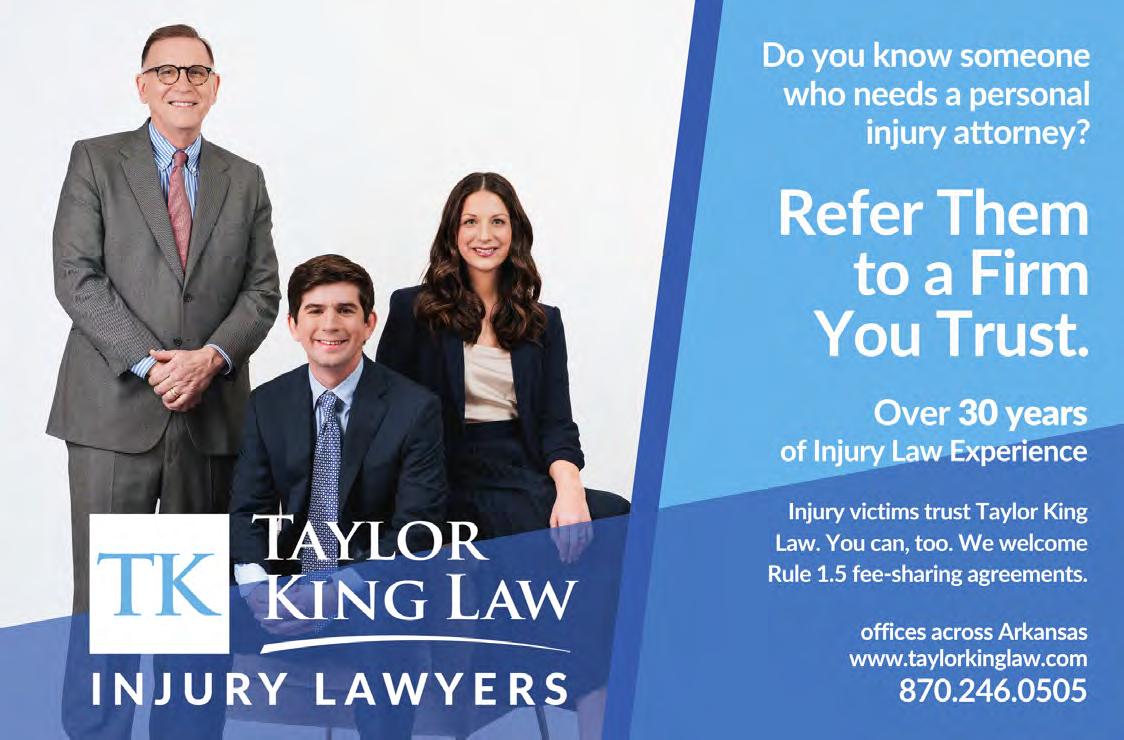

With the 2024–2025 year drawing to a close, the Young Lawyers Section still has its biggest projects for the year to look forward to. First, our annual Wills for Heroes clinic is set for May 31, 2025. This clinic brings together attorneys and law students from all over the state, and we hope to make it our best one yet. My plan for the clinic this year is to use it to further the goals of YLS and the Bar Association as a whole.
First, my hope is that the Clinic will be an effective way to connect attorneys from all over the state with the Bar Association. We are sending out invitations to first responders in every corner of the state to connect with attorneys who may not have any experience with the Association. By providing pro bono services to communities all over the state, we create more opportunities to engage with attorneys who may not ordinarily engage with us. Likewise, we hope to get our name out there and remind people of the important things that our association can do when we work together.
My second goal with the Wills for Heroes clinic is to help educate new attorneys and law students. The clinic is a fantastic way for new attorneys to get experience in drafting basic estate documents, while having other attorneys to oversee and guide them. As someone who interacts with both new and veteran attorneys, I regularly get feedback that younger lawyers are not getting the direct experience they need before going out and practicing. My hope is that this clinic can help new attorneys get that experience, and connect young lawyers with seasoned professionals who can be life-long mentors. One of the most valuable things I have gained as a member of this Association is the connections to mentors who have guided me as a young attorney. I hope to pay it back to the new attorneys
Frank LaPorteJenner is the Chair of the Young Lawyers Section. Frank is a managing partner of LaPorte-Jenner Law, PLLC.










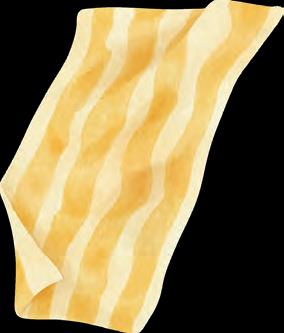


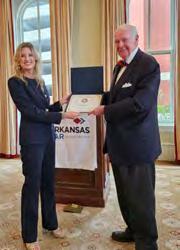
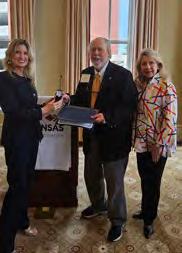

Above top: Honorees celebrating 50 years of membership gathered for a group photo at the luncheon. Above left: ArkBar President Kristin Pawlik presents a 50-year pin to Past President Bob Estes. Above center: Past President H.T. Moore receives his pin, joined by his wife, Linda Lou. We were proud to recognize two past presidents among this year’s 50-year members. Above right: Members shared memories from their time in practice.
Attorneys, CPAs, and financial advisors across Arkansas turn to us as a trusted partner in charitable investing. With expert knowledge and customized solutions, we help you guide your clients toward meaningful, tax-smart philanthropy.
Arkansas Community Foundation: engaging people, connecting resources and inspiring solutions to build Arkansas communities.
The Arkansas Bar Association proudly congratulates the following members on reaching an incredible milestone—50 years in the practice of law. These individuals were recently honored at a special luncheon at the Capital Hotel, where ArkBar President Kristin Pawlik presented each attending honoree with a commemorative pin and certificate in recognition of their distinguished service to the profession.We are grateful to these members for their decades of leadership, service, and contributions to the legal community:


Mr. Wayne Ball
Mr. Marc I. Baretz
Judge Kathleen Bell
Mr. Lonnie R. Beard
Mr. Bill W. Bristow
Mr. Noel F. Bryant
Mr. Carl W. Bussey
Hon. Ted C. Capeheart
Judge Susan Webber Wright Carter
Mr. Edward F. Cochran
Hon. Elizabeth Danielson
Justice Paul Danielson
Mr. Bob Estes
Mr. Bruce T. Garnett
Mr. Stephen Richmond Giles
Mr. James C. Graves
Mr. George Robert Hardin
Mr. Judson C. Kidd
Mr. James F. Lane
Mr. Stark Ligon
Hon. Mary Spencer McGowan
Mr. James Bruce McMath
Mr. Stan D. Miller
Mr. Harry Truman Moore
Mr. Michael C. O’Malley
Mr. Coy J. Rush, Jr.
Judge Joe Carter Short
Judge Hamilton H. Singleton
Judge (Ret.) Kim M. Smith
Mr. Donald M. Spears
Mr. Hugh Spinks
Mr. Thomas B. Staley
Mr. James W. Stanley
Judge Samuel Turner, Jr.
Dr. Jerry J. Vervack
Judge Morgan E. Welch, Jr.
Mr. David H. Williams
Hon. Ralph Edwin Wilson, Jr.
Mr. Arlon L. Woodruff




By Judge Cindy Thyer


Judge Cindy Thyer is currently serving on the Arkansas Court of Appeals.
Heading into my third year on the Arkansas Court of Appeals, I have had occasion to appreciate being a student of the law from three completely distinct perspectives. Without question, having these different perspectives has enriched my understanding and view of the law, our legal system as a whole, and all of us who have a role to play in it. Prior to being elected to the Court of Appeals, I served as a circuit judge for almost 17 years. And prior to that, I was a practicing trial lawyer like many of you, with the privilege of trying every type of case—criminal, civil, domestic, dependency-neglect, etc.—before judges and juries. I have often thought what a better trial lawyer I would have been if I could have come into the practice of law bringing experience from the circuit and appellate benches— the idea of “wishing I knew then, what I know now.” I realize that sequence is neither logical nor practical. However, knowing what I know now, I believe I would have been more strategic about the approach I chose in presenting each case (recognizing the valuable role of the trial lawyer as an educator, for example), and I most certainly would have been more deliberate in creating and protecting the trial record to be better prepared for the possibility of an appeal. I recognize now that there were times as a lawyer that I was too singularly focused on the task at hand—the trial itself together with all the concomitant issues that arise from it like the introduction of evidence, examination of witnesses, and the arguments I thought might persuade the trial judge to rule in my favor on legal issues— rather than looking ahead to a possible appeal.
Whether you are a trial attorney who continues the representation of your client through the appeal, or whether you refer your client to a lawyer whose practice is more appeal-centric, it is critical to keep in mind that the process from trial to appeal needs to be seamless. Trial attorneys must understand the appellate attorney’s perspective and consider the client’s case from a holistic viewpoint so that decisions regarding the arguments and objections
made, or not made, during trial will not jeopardize appellate counsel’s efforts to succeed on appeal. While the rules below are not new ones, they are restated here as important reminders for trial counsel. They bear repeating because during the first quarter of 2025, in the Arkansas Court of Appeals alone, almost a dozen appeals had at least one issue that could not be reached by the court because an argument or objection was raised on appeal that was not raised or argued below or because counsel did not obtain a ruling by the trial court.
Failing to Raise an Issue before the Trial Court. It is well established that in order to preserve an issue for appellate review, it must first be raised before the trial court. This rule transcends every type of case; the property case of Bobo v. Askew1 is illustrative. On appeal, the Bobos posited several arguments, one of which was that an easement could not be granted in excess of its historical use. Whether the trial court erred in expanding the easement beyond its historical use, however, was not reached by our court because this argument was first made on appeal. Similarly, in a case involving the valuation of marital assets, Gillum v. Gillum,2 the appellant was foreclosed on appeal from asserting that the trial court failed to make a separate valuation for one of the party’s businesses because trial counsel did not ask that the business be valued separately below.
Changing Arguments on Appeal. A close kin to the failure to raise an argument below is the related, but distinct, pitfall of changing one’s arguments on appeal. Changing one’s argument on appeal, like the failure to make an argument in the first instance, is not limited by case type. Two recent criminal cases highlight the problem. In Martinez v. State, 3 the appellant was charged with rape. His directed verdict motion at trial was that there was insufficient proof of penetration to support the offense. On appeal, however, the appellant changed his argument to assert that there was insufficient evidence to support the sexual gratification element of the offense.
Similarly, in Allen v. State, 4 the defendant’s directed verdict motion at trial was that the State failed to prove there was probable cause sufficient to conduct a search. On appeal, however, the defendant changed her argument, positing that she was not in possession of the drugs found during the search. Our court did not reach the merits of either appellate argument because in both cases the appellants changed their arguments on appeal.
Failing to obtain a ruling below. Likewise, our court continues to see the occasional failure of trial counsel to obtain a ruling from the trial court on issues big and small. So, even when arguments are properly raised, and even when those arguments are consistent with those presented on appeal, if trial counsel fails to obtain a ruling on an issue from the trial court our court will likely be unable to decide that issue. The recent case of Johnson v. State5 is illustrative. Johnson argued, in a motion to suppress his statement to police, that he was not properly Mirandized, he did not make a knowing waiver of his rights, and he had invoked his right to counsel. The trial court denied the motion, ruling that Johnson knowingly waived his right to remain silent. The trial court did not rule on Johnson’s claim that he had invoked his right to counsel. Johnson argued on appeal that the trial court erred in denying his motion to suppress, but because he failed to obtain a ruling on his argument that he invoked his right to counsel, appellate review was precluded.
Making contemporaneous objections. Another issue our court continues to see on a recurring basis is the failure to make a contemporaneous objection—a somewhat related, but distinct, pitfall. It is axiomatic that a contemporaneous objection is required at the first opportunity, and, generally, must be renewed each time the issue is raised. This issue arose recently in Arkansas Department of Environmental Quality v. Oliver no contemporaneous objection made to a Workers Compensation Commission decision which allowed a claimant a second change-of-physician. Here, our court did
not reach the merits of the objection on appeal because trial counsel failed to make a contemporaneous objection below.
As these cases—and others not mentioned here—show, these recent omissions are strong evidence that the axioms are not understood or perhaps overlooked at the trial level. Our appellate standard of review, however, will not allow us to reach even those “winning” arguments except in the most extraordinary of situations.7 It is therefore critical that trial lawyers keep the perspective of appellate counsel in mind so that all potential appellate points can be considered on appeal.
Endnotes:
1. 2025 Ark. App. 62.
2. 2025 Ark. App. 95.
3. 2025 Ark. App. 119.
4. 2025 Ark. App. 124.
5. 2025 Ark. App. 2.
6. 2025 Ark. App. 56, 704 S.W.3d 877.
7. See Sutton v. Falci, 2024 Ark. App. 46, 683, S.W.3d 593 (noting that while some of appellant’s arguments may have presented legitimate questions for appellate review, her failure to preserve them prevented this court from addressing them substantively). ■

Insights from the Judiciary
Live at the Annual Meeting
Join us for the Judges’ Roundtable at the 127th Annual Meeting.
Earn 1.5 hours of CLE and hear directly from the bench—Friday morning, June 13 at Oaklawn Resort in Hot Springs.
Justice Rhonda Wood
Practicing before the state’s highest court can be both exciting and stressful for new attorneys or attorneys new to appellate practice. I can say this with experience because my first case took place within two years of passing the bar exam. I was petrified. But looking back, my fear was unwarranted. As a sitting justice, I know appellate judges want counsel to perform well so we have the necessary information to make wellinformed decisions. Following some basic best practices can help make your appearance at the Arkansas Supreme Court a successful and professionally satisfying experience.

Justice Rhonda Wood is serving in her eleventh year as a Justice on the Arkansas Supreme Court and her nineteenth year on the bench in Arkansas.
Read and Follow the Rules. We have rules that cover everything from the timing of appeal, to the font size, to the word count in briefs. We take them seriously, especially when it comes to our jurisdiction. Many are particular to practicing before our court. The last thing you want is for your client to be at a disadvantage—or worse, for your appeal to be dismissed on a procedural ground rather than having the matter decided on the merits. Our court expects exacting compliance with procedural rules because equity demands it; no one gets special treatment. We hold attorneys to the high standards expected of those with the privilege of practicing this honored profession.
Ask Questions. As with any court, the Clerk of the Court is your friend. Our Clerk of Court is Kyle Burton and his Chief Deputy is Linda Barkley. They are experienced, knowledgeable professionals and will be as helpful as they can be within appropriate professional parameters. New practitioners should reach out when wading in and before ending up chin deep in a procedural muck. You don’t know what you don’t know, but they do.
Start Early. Timing matters. In civil cases our timing rules are unforgiving. The deadlines start from the moment the trial court enters judgment. Smart appellate lawyers make a list of all the deadlines and check it twice. The earlier you begin, the more prepared you will be when you inevitably run into obstacles. If something does go wrong, immediately pick up the phone, send an email, and document the problem. It may not save your appeal, but failure to document your timely attempts to correct it will hinder your chances of having an error excused.
Motions Matter. Familiarize yourself with the court’s motion practice. Motion practice is an important part of the court’s work. Your case often depends on more than just an appellate brief. Motions can greatly influence the timing of a decision. Once you file your motion, the responding party will have 10 days to respond. After the response, the Clerk will place your motion on the next motion submission. This could result in a motion being submitted to the court three to four weeks after you file it. If you believe an emergency or a special circumstance requires an expedited timeline, you must be very specific in alerting the court to your request for an accelerated response. Hide this information in your prayer for relief at your own peril. Ideally, include it in the title of your motion “[Motion Name] and Request for Accelerated Response and Emergency Relief.” If you want a stay, put that in your heading, too. But just because you ask for expedited relief doesn’t mean you will get it. It simply means the court will consider deciding the matter on a “fast track.” And don’t be the Boy Who Cried Wolf—save your credibility and requests to expedite for when it really matters.
Know The Justices. The Arkansas Supreme Court is not a monolith; it is made up of seven individual justices. For your client to win, you will need to persuade at least four of them that your legal argument is correct. Savvy lawyers will not only know our court’s precedents but will know their audience: who they are trying to persuade and how to craft arguments in the best light. Our thoughts and opinions on legal issues are publicly available in the decisions we publish each week. Read recent cases written by all seven justices, including those beyond your specific issue on appeal. Get a sense of the types of arguments that are successful and the way each justice approaches the law. You can often glean important insights to make your briefs and oral arguments more effective.
Request Oral Argument. Then Prepare, Prepare, Prepare. There is an old myth that oral argument isn’t likely to change

the outcome of a case. While this might be true of other courts, it is not true of our court. Oral argument is the best opportunity that you will have to engage with the justices deciding your appeal and persuade them to adopt your argument. Do not plan to read your brief or blandly recite the facts. Expect an open and active conversation about the nuances of your case and how it may impact the law on a wider scale. The justices’ questions may give you a sense of how they are approaching the issues on appeal, where your arguments are connecting, and where you need to reinforce your argument. If you are granted oral argument, prepare, prepare, prepare. Then prepare again. Preparing for oral argument is an opportunity to hone your best arguments and bolster your weakest arguments. Know the record cold. Review your arguments from the trial court and see where you can improve. Identify the questions you are most likely to be asked at oral argument – especially those questions for which you don’t have a strong answer. Write out your best answers to these questions and practice them over and over and over. Ask colleagues to moot your argument before the day itself. Watch recorded oral arguments online of advocates you admire and see how they performed. Come and watch an oral argument in person and see how it feels to be in the room. Knowing your audience and feeling comfortable in the environment can set you up to succeed.
Tell Us What Remedy You Want. This might seem obvious. But we often
get briefs and motions with a concluding sentence that says, “Therefore, we ask you reverse/affirm the circuit court.” Don’t assume we know—tell us exactly the remedy you are seeking on appeal. If you want us to reverse, is it to enter judgment for your client? Is it to reverse and remand for a trial? Is it to reverse, but also to vacate an award of attorney fees? If you make us guess, we may guess incorrectly and to your client’s detriment.
On
Starts at the Trial Court. Our court can only review those issues that are preserved for appeal. If you didn’t make the objection, raise the issue, or get a ruling below, we likely can’t review it. If you save your best arguments or most thorough review of the issues and precedents for your appearance before our court, it’s already too late. Thus, the preparation for your appellate case ideally begins pretrial.
In conclusion, much of the advice I provided is likely similar to that for other courts, with a few Arkansasspecific wrinkles. We welcome new and experienced attorneys and want a robust and diverse bar practicing before us. Last, please stop in and visit our building, and bring your families. If you have not had an opportunity to see our new Civic Education Center and tour the familyfriendly exhibit space, it is a sight to behold and open to the public when the Justice Building is open. Perhaps if you show up on a Thursday, you can catch an oral argument. ■
RMP LLP welcomes 11 new attorneys to serve you!





With nearly 40 years of experience, Tim leads complex medical malpractice, mass tort, and product liability litigation. He’s recognized by Best Lawyers and is an AV-rated attorney.
Cale focuses on business law, mergers, construction, and regulated industries. A skilled negotiator, he has closed over a billion dollars in transactions and is a licensed mediator.
Sarah is a trial attorney specializing in medical malpractice, products liability, and mass torts. She has secured victories across multiple jurisdictions. A sought-after witness preparation expert, Sarah ensures her clients are prepared for high-stakes litigation.
With 30 years of experience, Mark advises businesses on corporate transactions, real estate, and trust disputes. He has led high-profile commercial litigation and public contract negotiations.
Zach handles commercial litigation, medical malpractice, insurance disputes, and has a robust appellate practice. A mechanical-engineerturned-attorney, he’s first-chaired trials in state and federal courts and is known for his meticulous trial practice.






Doris focuses on consumer protection and veterans’ legal services. A Bowen School of Law graduate, she was recognized as a 2024 Legal Elite and earned top papers in multiple disciplines.
Casey focuses on business law, mergers and acquisitions, and litigation. A Bowen Law graduate, she served as an Articles Editor and participated in the Low Income Taxpayer Clinic.
Reece practices utility and regulatory law, corporate law, and M&A. He previously served as an Assistant Attorney General in consumer protection and regulatory compliance.
Jenny specializes in taxation, business law, and estate planning. She has extensive experience in corporate governance, nonprofit formation, and regulatory compliance.
Perry specializes in business law, mergers, acquisitions, and construction law. He has led over $1 billion in transactions and served as a Deputy Prosecuting Attorney.
Mary Carole specializes in medical malpractice defense and education law investigations. A respected trial attorney, she serves as a Special Justice on the Arkansas Supreme Court.
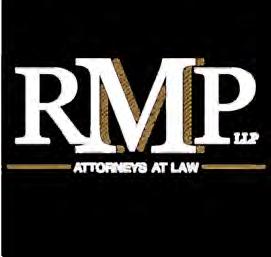
By Martha Ayres

Iused to be a law clerk at the Arkansas Court of Appeals. In private practice, I frequently reflect on that formative experience. Being a law clerk is like having a backstage pass to appellate decision-making. An appellate opinion may list only one judge’s name at the top, but it is the product of a collaborative, thoughtful, and highly-structured team process. Behind every written decision are multiple conversations—and often a debate.
Here is what appellate law clerks wish lawyers knew:

Martha Tucker Ayres is an attorney at Table Law in Little Rock. She enjoys writing briefs for clients and for other lawyers who’d rather not.
One of the first questions a law clerk will ask when a case comes in is: Does the appealed order dispose of all claims and all parties in the action? There are some exceptions, but in Arkansas, a final order is almost always the starting point for appellate jurisdiction. Determining finality is not always easy. (See related article by Judge Brandon Harrison and Amber Davis on page 20). You may need to consult the rules and a decent amount of case law.1 It is also a good idea to review jurisdictional filing deadlines, like those for filing a record or a notice of appeal. And if you’re the appellee and you see a jurisdictional problem—shout it from the rooftop. File a motion to dismiss and attach to the motion as an exhibit all the record materials needed to support the motion. Judges and clerks will quietly thank you for saving everyone the time. Jurisdiction cannot be waived and may be raised for the first time in an appeal. The court would rather resolve a threshold issue quickly than spend substantial time working up a case that it has no power to decide.
Even if you have a final order and the court has jurisdiction, your key appellate argument won’t go anywhere if it wasn’t preserved below. You have to show court hawks where you raised the important issue in the record, that you raised it at the right time, and that the circuit court expressly ruled on this issue. Missing any of these key steps will likely kill your appeal before it even starts.
While the preservation doctrine can feel like it’s all about technicalities, it is rooted in principles of fairness. It gives everyone a chance to fix mistakes or problems before these errors can become a basis for a reversal in an appeal.
A clean and chronological Statement of the Case and the Facts is your best shot at setting the stage. Start at the beginning and walk the court through what happened—clearly and simply. Clerks are not looking for advocacy in this section. They are just trying to get their brains wrapped around the case initially. If you confuse the clerk here, everything that follows is on shakier ground. Worse, frustrate them with a distorted or disorganized version of the
facts, and the whole stage begins to buckle before the argument even starts.
One of a law clerk’s least favorite tasks is going on a scavenger hunt through the record to collect facts. Put them all here, in one place, with proper record citations—it builds a lot of credibility. Most attorneys do not include enough material facts early on in their briefs.
So ask yourself early on: What are the material facts that will influence a decision when applied to the law? Law clerks read hundreds, if not thousands, of electronic record pages every week since the abstract requirement was abolished. Help them help you (and your client). Tell them a story that makes sense and where to find it in the record.
A good appellate argument section has a strong hierarchical structure and a logical flow. Too many briefs use a stream-ofconsciousness where a clerk must stop, reread, and then guess what the lawyer is even trying to argue. Sometimes the heading does not match the argument that follows it. That’s no joke.
Be kind to the reader. If your point can be said in one sentence, don’t take a paragraph. If your theory has three parts, say so. If there’s a roadmap to reversal, show it. Appellate judges have dozens of briefs to get through in a month—make yours the one they remember because it was so clear and easy to follow.
As a law clerk, one of the more common missteps I saw lawyers make was when they presumed that the court already knew and understood a specialized or nuanced area of the law. Arkansas appellate courts are, by design, generalists—handling every kind of case that comes through the door from all 75 counties across the state. So if you are briefing a UCC Article 4 case or a complex trust matter, for example, you need to assume that you are starting from scratch. Brief the case like it’s day one of law school and no one has read the book yet. Clerks are far more familiar with issues in custody disputes, boundary lines, or criminal
cases than they are with bank deposits or trust accounting. Unless a judge or clerk happened to work in that niche area in a prior career, it’s unlikely they know it as well as you do—so take the time to walk them through the law step by step. Teach first; advocate second.
Most law clerks genuinely enjoy the anonymity of the job. They are professional ghostwriters to one degree or another. Their job is to make the judge’s job easier—to get them what they need to make the best decision possible. Law clerks are not googling you. They are reading the brief in front of them and evaluating it on its merit. You may be a local legend, but the brief must do the work to persuade here.
Law clerks also have a strong preference— call it a bias—for Arkansas cases. Citing other jurisdictions is fine, but it shouldn’t come before a thorough discussion of what Arkansas appellate courts have said about an issue, even if the issue is still developing. But if you are briefing a federal constitutional issue, don’t leave the Supreme Court of the United States out of the conversation.
Law clerks take the job seriously—more seriously than most people probably realize and credit. There’s an unspoken code of honor in chambers: get it right, be fair, don’t cut corners. The work touches real people and real outcomes, whether a clerk agrees with a particular outcome or not.
That said, there are strict internal deadlines that a law clerk must follow. Some cases are harder than others. Some records are messier. Some issues are brand new; some are well-settled. When a reply or appellee brief tackles the tough questions raised by the opposing party head on, it can be a gift to a clerk caught between a rock and a hard place in figuring out where a case should go. Don’t be afraid to answer the tough questions—lean in and help the court get to the result you want.
8. There is a Team, Not a Machine
I imagine that a lot of lawyers picture a judge reading briefs alone and then issuing a ruling. That is not how it works at the
appellate level. Cases are first reviewed and sorted by a team at the clerk’s office. Each case is then worked up by a team of judges, law clerks, and possibly staff attorneys. They read, talk, debate (even in the halls), write, rewrite, edit, and rewrite some more. I once helped draft a dissent, a concurrence, and a majority opinion in the same case before the court decided what direction to go.2
Beyond substance, a final opinion passes through many capable hands. Every office reads the circulated opinions. Excellent proofreading and quiet attention to detail also come from the Reporter’s office. The Court of Appeals isn’t perfect, but it takes its responsibility seriously. Take heart. It’s all part of a team process.
Different people see different things. One of the best parts of being a law clerk, for me, was talking cases with colleagues. Often when I was stuck, I would seek out someone who often saw things the opposite way I did—because those conversations pushed me to see the case from a different angle and brought me closer to clarity. As a law clerk, I had no vote. My job was to understand how my boss or another member of the panel reasoned through a decision—and to write that view with integrity.
And sometimes, I missed the mark. A senior clerk would leave me handwritten yellow sticky notes on a draft. They were, at times, mortifying, but also helpful. That kind of mentoring and careful attention to what the law requires is something I’ve come to appreciate even more in solo private practice.
I hope this article was helpful. A thoughtful brief won’t guarantee you a win, but it will make a difference behind the scenes. If you start by making a law clerk’s job easier, you’re already making the judge’s job easier. That’s the first step toward an appellate victory—and a curtain call you can be proud of.
It’s what appellate law clerks wish lawyers knew.
Endnotes:
1. For example, Ark. R. App. P.–Civ. Rule 2, 3, & 5; Ark. Sup. Ct. Rule 4-2, 6-9. 2. See, e.g., Davis v. State, 2019 Ark. App. 303, 577 S.W.3d 714. ■
By Judge Brandon J. Harrison and Amber Davis
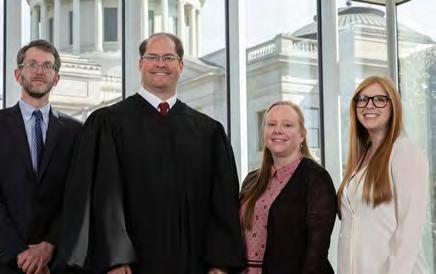

You do not have to be long-in-tooth to notice that Arkansas’s appellate courts have something like a fetish for finality. Of course, the general and basic rule that appellate courts should not expend resources on half- or three-fourths-baked appeals makes obvious sense; and the pillar holds up well in most cases, especially in multi-party, multi-claim ones when lawyers and circuit judges move through files and do not tie loose substantive ends clearly enough on the record as the landscape changes. On the record are the key words in that prior sentence.1 We understand: the hurly-burly, volume, and pace in circuit court can be daunting to manage.
The Court of Appeals receives a handful of motions each year asking it to determine (clarify) whether an order in a case is a “final, appealable order.” This shows that the lawyers do not know for certain what they have in hand after the record has been filed with our Clerk of Court, Kyle Burton. One or more parties ask because they do not want to spend time and client money writing appellate briefs—only to be told later that the case must return to circuit court for a supplemental record (often an additional order or a more precise one) that more clearly establishes appellate jurisdiction. We know: the uncertainty and timewaste associated with so-called nonfinal orders are sinkholes. On the other hand, that seemingly “easy ask” conflicts with a separate pillar that appellate courts do not give advisory opinions on cases, much less a subpart of the whole. If both parties agree that an order is not final for purposes of an appeal, the court may treat the motion as one to dismiss the appeal without prejudice so the parties can avoid briefing and therefore save time and expense. (Sometimes the relief will be a remand, not a dismissal.) But absent (i) full agreement, (ii) an appellant’s voluntary motion to dismiss the appeal, or (iii) an appellee’s motion to dismiss that persuades 7 out of 12 judges at a motion conference that the case should be dismissed for lack of finality, the appeal will be submitted to a court panel, where appellate jurisdiction will be reviewed on the record presented; a routine event in all appeals.2
Finality is admittedly a big topic, so this article, as its title portends, concentrates on one issue that arises rather frequently: when the Court of Appeals will decide that an unresolved contempt issue adversely affects appellate jurisdiction so that it declines to reach the merits of the main issue(s) on appeal. It is no surprise to the experienced practitioner that a “dangling” contempt issue often appears when one party asked the circuit court to hold another party in contempt for this or that reason—but the court did not rule at all, did not do so clearly enough, or perhaps found that a party committed contumacious conduct but chose not to impose a sanction before an appeal was taken and the record lodged. In our experience, contempt/finality issues most often appear in the family-law context, though they of course appear elsewhere. Is there a better way to handle unresolved contempt/finality issues in these cases besides dismissing an already-briefed appeal without prejudice and injecting more time and expense into a case that has been percolating for a considerable portion of the parties’ (and often children’s) lives? Maybe, maybe not. But we would like to start the conversation.
We first acknowledge the rule that provides an appeal may be taken from a “civil or criminal contempt order [that] imposes a sanction and constitutes the final disposition of the contempt matter.”3 Likewise, “[a]ll final orders awarding custody are final appealable orders.”4 A third important rule is that an appellant’s notice of appeal is supposed to state that unresolved claims are abandoned.5 The latter often happens, but not always; and importantly, an appealing party cannot abandon a different party’s claim(s). (Ditto for cross-appeals.)
Against this backdrop, the Court of Appeals has faced cases involving unresolved (dangling) contempt motions, or murky orders, many times. In some cases, the court addressed the merits of the appeal despite the unresolved contempt issue. In other cases, it did not. Is there an identifiable logic or principle at work? It is a question worth asking. While it may be a bug but not a feature of the operating system, we can observe some cases where a dangling

contempt petition was filed before the circuit court entered its order on the main issues the parties appealed, the court declined to reach the merits. In a recent case, however, the dangling contempt petition was filed after the circuit court entered its main order. Yet the court addressed the merits of all the issues presented—except the contemptrelated ones. We explore the intersection of contempt and finality more below.
Many cases appealed to the court the past decade show that one party or the other moved for contempt before the circuit court entered a purportedly final order, and the “final” order on the merits (often divorcerelated) did not clearly address the contempt issue. In those cases, the court held that it did not have appellate jurisdiction because the main order on the merits was not final.6
This distinction seems to hold outside the family-law context.7 In Vaden, for example, the perceived final order did not address several of the parties’ issues—including a motion for contempt filed several years before the order on appeal was entered. The Court of Appeals held that the order sought to be addressed was not appealable because the circuit court had failed to rule on all claims: “Here, the circuit court had not decided all the issues because the contempt issues were still outstanding.”8 There is another important statement in Vaden, which was repeated soon after that case was decided. It is worth highlighting now. “[C]ontempt is not merely a collateral issue, like attorney’s fees[.]”9 The concept of collateral-ness will pop back up.
While making no promises but also telling no lies, one exception we have found to our admittedly generalized statement
about the timing of “final orders” relative to contempt petitions appears in childcustody cases.10 In Hamerlinck, the circuit court entered an emergency ex parte order and amended temporary order granting custody to a child’s father in November and December 2018. In late 2019 and early 2020, both father and mother filed motions for contempt. In November 2020, the circuit court entered an order granting a divorce and deciding issues of property and child custody. The order did not address the parties’ contempt motions, but the Court of Appeals still reached the merits of the parties’ child-custody issue. “Because contempt issues remain pending in this case as well, we lack a final order as to all issues other than custody. Accordingly, we dismiss without prejudice Andrew’s challenges to the circuit court’s decisions regarding the division of the marital assets.”11
Hamerlinck and cases like it might not surprise too much given the rule that childcustody orders are appealable.12 But pull that thread further and ask, if unresolved contempt issues do not destroy the finality of a child-custody order, why should they operate with virtual jurisdictional impunity elsewhere, at least in the family-law context? It is of course important to ask if the remainder of the case is ripe for an appellate decision. In Williams, for example, the court addressed child-custody issues but stopped shy of deciding the merits of the remaining issues on appeal. Why stop? Because the decree contemplated future action on alimony, child support, and the sale of the couple’s property. Further, the record did not include “written orders demonstrating that the circuit court ruled
on several petitions for contempt that Amy filed.”13 For these reasons, the court “dismiss[ed] the remaining issues in the appeal for lack of a final order.”14 The first statement is a perfectly good reason not to go all the way; the Court of Appeals could not have itself resolved main issues left undecided or undone. But the statement on the importance of unresolved contempt issues persuades less on reexamination. Postscript: all the petitions for contempt were filed before the final divorce decree was entered. There is insufficient language in the opinion, however, to tell whether timing was jurisdictionally important to the panel.
It is worth taking something of a breather to note that at least one case has not equated a child visitation with a child-custody issue for appellate-jurisdiction purposes. In Burton v. Templeman, 15 the Court of Appeals wrote: “The circuit court decided the visitation issue, but it specifically reserved a ruling on the contempt issue. And we have no Rule 54(b) certificate that might create the finality necessary to vest this court with jurisdiction to address the visitation issue that was decided. Because the February 26 order that Tina has appealed is not a final, appealable order we must dismiss this appeal without prejudice.” On further reflection, is there a meaningful distinction, for finality purposes, between an appeal involving child visitation versus child custody, from a dangling contempt perspective? If so, what is it? It is not apparent that there is a pragmatic distinction. And we dare say only a modern-day St. Anselm could state a theoretically important difference. It is time to be open to a new approach, not the reflexive one now embedded.
Now consider Barter v. Barter, 16 where the Court of Appeals addressed child-custody issues, including attorneys’ fees (usually deemed a collateral matter), but did not address a contempt ruling (usually deemed a noncollateral matter). Barter differs slightly from the other cases noted above because the circuit court had found the party in contempt but had not yet imposed a sanction.17 The Court of Appeals held that while it could reach the other issues (child custody and attorney’s fees) it would not touch contempt. “Because the [circuit] court did not impose a sanction, the order is not final as to contempt, and we dismiss the
matter of contempt without prejudice.”18
The case shows that when joined with particular issues (for example, child custody and fees) an unresolved contempt issue will not delay or tank the entire appeal.
Another case, Fox v. Fox, 19 is worth highlighting. There, the parties filed various motions for contempt before the circuit court entered a modified order addressing visitation and calculating child-support and alimony arrearages. The modified order found both parties in contempt and ordered them to submit applications for fees that the circuit court would decide “based on the level of contempt of each party.”20 The Court of Appeals declined to address the merits and dismissed the appeal without prejudice for lack of a final order because the contempt matter was still pending when the appeal was taken.21 So, unresolved contempt joined with adjudicated visitation, child-support, and alimony arrearages will destroy finality. But unresolved contempt will not affect the finality of child custody or attorney’s fees orders.
If you are wondering, the contempt motions in Fox were filed before the circuit court filed the order that was appealed and then briefed on appeal. The court did not make the timing issue of obvious jurisdictional importance, but maybe it was so in some unstated sense. We cannot say either way. We can, however, ask again: what is the real difference between a visitation and custody decision for finality purposes? More pointedly, why not permit circuit courts and parties some consistent leeway and grace, jurisdictionally speaking, in the family-law context?
For a case where a contempt petition arrived after the main order was entered, we turn to Kinder v. Kinder, 22 which did not concern child custody as a primary matter, and the Court of Appeals decided all the merit issues, save a dangling contempt motion. The unresolved contempt motion was filed after the circuit court’s order, and the appellate court held the issue to be unreviewable; it did not, however, deem the unresolved issue an impediment to finality or to deciding the main points on appeal (our emphasis):
A contempt matter is between a party and the court, not between
the parties themselves. An order of contempt is independent of the merits of the underlying case between the parties. We have held that a finding of contempt is appealable when it finally decides the matter between a party and the court. For a judgment to be final, it must dismiss the parties from the court, discharge them from the action, or conclude their rights to the subject matter in controversy. Here, the controversy was the allegations that David disobeyed certain court orders. The trial court “held in abeyance” any punishment, which means the order did not conclude the matter between it and David, so we will not review it.23
Kinder is like Fox and Barter because in all three cases there was a finding of contempt by the circuit court, but no contempt-related sanction had yet been imposed when an appeal was taken. As we have recited, historically speaking, that unresolved issue would tend to require a dismissal of the appeal without prejudice. But that did not happen in Kinder. 24 Reread our italicized phrasing in Kinder. Now ask yourself: if contempt is primarily an issue between a party and the court, why should an unresolved contempt petition (motion) necessarily affect appellate jurisdiction on the so-called main substantive issues from which the contempt disputes spawn? In a practical sense, and when properly appreciated, the finality doctrine essentially forces a circuit court to act when it may think it best not to act. It is not clear why a circuit judge must decide a contempt petition to ensure appellate jurisdiction attaches to main litigation points—when simply threatening a contempt finding, or holding a sanction in abeyance, can ensure behavioral changes during litigation.25 If viewed cynically, but making no accusations, a circuit court could theoretically exert some level of practical control over the vesting of appellate jurisdiction by stalling a ruling on one or more contempt issues. The thoughtprovoking point here is simply that the contempt/finality intersection likely needs flashing yellow lights and more fluidity—
not the binary red-green configuration that is typical today.
Besides being a case where the contempt petition was filed after the circuit court’s order on the merits of the main issues had been entered, which may or may not have made an analytical difference, does Kinder potentially herald a new mindset that subordinates (untethers) unresolved contempt issues to merit-based issues? There is support for the idea already baked into the rules. The independent appealability of contempt orders that impose a sanction26 strengthens the argument for treating contempt proceedings as jurisdictionally separate. The Arkansas Supreme Court has held so for motions seeking the equally nonmerit-related issue that a party violated Rule 11 of the Arkansas Rules of Civil Procedure.27 The court relied on the United States Supreme Court’s holding in Cooter & Gell v. Hartmarx Corp., which stated “[l]ike the imposition of costs, attorney’s fees, and contempt sanctions, the imposition of a Rule 11 sanction is not a judgment on the merits of an action. Rather, it requires the determination of a collateral issue: whether the attorney has abused the judicial process, and, if so, what sanction would be appropriate.”28 Are contempt issues collateral to main substantive claims, or aren’t they? It is too soon to make a strong prediction on whether the Court of Appeals will revisit its finality rule in the contemptrelated contexts, but it is worth thinking about. Perhaps it will soon reexamine why unresolved contempt issues are deemed noncollateral to the primary issues from which contempt petitions spin off. Having read a fair number of cases to prepare for this article, we could not find any deep reasoning in the caselaw explaining why contempt issues must be seen as having pivotal jurisdictional importance à la the finality doctrine. And that distinction often makes a jurisdictional difference. * * *
Whether the timing of a contempt motion filed in circuit court is a “finality factor” to the Court of Appeals seems an unanswerable question right now; again, it is more likely a bug than a feature of the court’s jurisdictional operating system. Regardless, one may fairly ask if that distinction matters at all. And why
can’t pending contempt motions/issues be deemed “unpreserved,” “abandoned,” or perhaps just ignored as being collateral to the main issues the parties thought important to appeal as shown by the points briefed on appeal? If parties do not care to resolve contempt-related points in circuit court, why should the Court of Appeals care more than they do? Do not mistake our intentions: we are not seeking to undermine drastically the finality doctrine, which, as we have plainly acknowledged, makes sense in most cases and for many good reasons. But any doctrine can become over-inclusive, too rigidly applied, and therefore create inefficiencies, not efficiencies. Maybe, we suggest, the principle that unresolved contempt issues are not collateral and therefore must have finality implications should be tempered, if not entirely reimagined. “The life of the law has not been logic: it has been experience.”29 In the meantime, the best we can do here is alert parties, lawyers, and judges and suggest all consider with intentionality how dangling contempt issues can affect appellate jurisdiction. For its part, the Court of Appeals may want to revisit an important facet of Arkansas’s finality doctrine, for no one benefits from the time, work, worry, and costs associated with dismissals of appeals. On that we can all agree.
Endnotes:
1. A recent example is Hughes v. Turner, 2025 Ark. App. 58, 704 S.W.3d 882 (appeal dismissed without prejudice for lack of finality).
2. See the article by Martha Tucker Ayres, What Appellate Law Clerks Wish Lawyers Knew, on page 18.
3. Ark. R. App. P.–Civ. P. 2(a)(13).
4. Ark. R. App. P.–Civ. P. 2(d). For an opinion that surveys caselaw on temporary versus final custody decisions, see Rivers v. DeBoer, 2019 Ark. App. 132, 572 S.W.3d 887.
5. Ark. R. App. P.–Civ. 3(e) (contents of a notice of appeal and notice of cross-appeal).
6. See, e.g., Sanchez v. Weeks, 2021 Ark. App. 493; Ballegeer v. Ballegeer, 2021 Ark. App. 390; Booker v. Booker, 2021 Ark. App. 327; Wilcox v. Wilcox, 2020 Ark. App. 489; Maxwell v. Maxwell, 2019 Ark. App.
229; Roach v. Roach, 2019 Ark. App. 34, 571 S.W.3d 487; John v. Bolinder, 2016 Ark. App. 357, 498 S.W.3d 307; Burton v. Templeman, 2015 Ark. App. 101.
7. See, e.g., Anderson-Tully Co. v. Vaden, 2018 Ark. App. 484, 562 S.W.3d 249.
8. Id. 2018 Ark. App. 484 at 5, 562 S.W.3d at 251.
9. Roach v. Roach, 2019 Ark. App. 34, 6, 571 S.W.3d 487, 490 (2019) (quoting Vaden, supra).
The full statement from Vaden is: “We have held that when contempt issues remain pending before the circuit court, the circuit court’s order is not final and appealable.”
Anderson-Tully Co. v. Vaden, 2018 Ark. App. 484, 4, 562 S.W.3d 249, 251. The embedded citation provides no deeper analysis on why this position was chosen instead of a “yes, it’s collateral; there’s no real finality concern” position.
10. See, e.g., Barter v. Barter, 2024 Ark. App. 182, 686 S.W.3d 872; Hamerlinck v. Hamerlinck, 2022 Ark. App. 89, 641 S.W.3d 659; Williams v. Williams, 2020 Ark. App. 204, 599 S.W.3d 137.
11. Hamerlinck, 2022 Ark. App. 89 at 12, 641 S.W.3d at 665.
12. Ark. R. App. P.–Civ. 2(d).
13. Williams, at 15–16, 599 S.W.3d at 145.
14. Id.
15. 2015 Ark. App. 101, at 2.
16. 2024 Ark. App. 182, 686 S.W.3d 872.
17. Barter, 2024 Ark. App. 182 at 20, 686 S.W.3d at 884-85.
18. Id.
19. Fox v. Fox, 2021 Ark. App. 416. 20. Id. at 2.
21. Id. at 5.
22. 2022 Ark. App. 476, 655 S.W.3d 880. 23. Id. at 476, 20, 655 S.W.3d at 892 (citing Taylor v. Taylor, 26 Ark. App. 31, 32, 759 S.W.2d 222, 223 (1988) (“After a hearing on the matter, the chancellor found appellant in contempt but imposed no sanctions.”)).
Here is how Taylor summed it all up: “The record reflects that this case remains pending in the court below; no final judgment or decree has been entered; there has been no order which is determinative of the divorce action between the parties; and no punishment was imposed on the appellant. Because the order is not appealable under Rule 2, the appeal is
dismissed.” Taylor v. Taylor, 26 Ark. App. 31, 33, 759 S.W.2d 222, 223 (1988).
24. Kinder was snakebit from the beginning and ultimately led to three appeals because of a jurisdictional dispute over the filing of the record. The case wound its way through the Court of Appeals and, in a much less fulsome sense, the Arkansas Supreme Court. See Kinder v. Kinder, 2022 Ark. App. 476, 655 S.W.3d 880 (Kinder III) (merits); Kinder v. Kinder, 2022 Ark. App. 39 (Kinder II) (jurisdiction), reh’g denied, review granted, opinion vacated (by docket entry only). See also Kinder v. Kinder, 2021 Ark. App. 40 (Kinder I) (jurisdiction).
25. The matter can be even more technical. For example, in the criminal-contempt context, the Arkansas Supreme Court has made a distinction between a mere postponement vs. a complete remission of sanctions: “Even if we said that these deficiencies were supplied by reason of the fact that the entire record in the case was designated and brought up, there is no basis for relief to appellant. The order itself discloses that the punishment for contempt was suspended. From the record, it does not appear that the suspension was merely a postponement of sentence so it amounts to complete remission in case of criminal contempt such as this.” Johnson v. Johnson, 243 Ark. 656, 660, 421 S.W.2d 605, 607 (1967). Whether that nomenclature difference remains significant, we cannot now say.
26. Ark. R. App. P.–Civ. 2(a)(13).
27. Spring Creek Living Ctr. v. Sarrett, 318 Ark. 173, 174, 883 S.W.2d 820, 821 (1994).
28. 496 U.S. 384, 396 (1990) (emphasis added).
29. O.W. Holmes, Jr., The Common Law 1 (1881). ■


At Public Notice Agency, we have one important mission: place all legal notices for firms like yours, saving you money and time while ensuring accuracy. Our team uses innovative technology to place your notices in qualified newspapers. We confirm scheduled publication, manage accounting, and provide you with proofs along with one invoice.

Expert Testimony: Unbiased, clear, and professional expert testimony in court to support your legal cases.
Forensic Investigations: Comprehensive analysis of accidents, mechanical failures, product defects, and more.
Detailed Reports: Thorough and scientifically backed reports that stand up to legal scrutiny.
Consultation Services: Collaborate with attorneys to develop a sound legal strategy with solid engineering expertise.
Years of Experience: Our team of forensic engineers brings years of hands-on experience in the field.
Credibility in Court: Trusted by top law firms for delivering concise, accurate, and compelling testimony that juries and judges can understand.
Timely & Professional Service: We work diligently to meet your deadlines while maintaining the highest quality standards.
Expert Witness Testimony
Mechanical Equipment Failures
VAR- Accident Reconstruction
Agriculture Accidents and Equipment
HVAC Fires & Product Liability Investigative Engineering
or 337-580-0285
By Judge Bart Virden

U.S. Supreme Court Justice Robert H. Jackson (1941-1954) put his experience with oral arguments this way:
“I used to say that, as Solicitor-General, I made three arguments of every case. First came the one that I planned as I thought, logical, coherent, complete. Second was the one actually presented—interrupted, incoherent, disjointed, disappointing. The third was the utterly devastating argument that I thought of after going to bed that night.”
Justice Jackson’s thoughts are not at all uncommon. All of us that have had oral arguments on appeals have felt the same. No doubt there can be a feeling of vexation or pointlessness if one goes into oral arguments feeling the judges have already made up their minds. My goal with this brief article is to encourage practitioners to overcome those feelings and seek out and seize the opportunity to argue your cases orally. Certainly, we, on the Court of Appeals, can’t and shouldn’t hold oral argument in every case before us. Last year we issued over 1100 decisions, with about 600 of them as written opinions. In a year’s time, we historically only hear about a dozen oral arguments. Personally, I think that number should be higher. Nonetheless, it is an opportunity for you to highlight your case among all the others. If the case is novel, difficult or unusual, don’t discount the value of oral arguments.
I think oral arguments are very important for us as well as the attorneys arguing them. Oral arguments are governed by Supreme Court Rule 5-1. Obviously, you should familiarize yourself with that rule and the restrictions therein. Perhaps the most important and ominous is the time limitation of 20 minutes. Yes, the case you have lived with for five years and taken down three dozen trees worth of paper needs to be conveyed to us in :20.
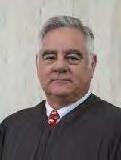
Judge Bart Virden has been on the Arkansas Court of Appeals for 11 years and resides on Petit Jean Mountain.
The rule cited above offers guidance on how to request oral argument. But you should also know that you can file a separate motion to put the request before the whole court if your initial request is denied. It would be very helpful if counsel for the other side joined in the request.
Here are some useful tips to make the most of that ever-so-brief time period.
• The oral arguments for the Supreme Court and our court are livestreamed. Watch some. You will see what is and is not effective.
• Keep in mind that we have read the briefs. We will not have conferenced the case, but have had the briefs in our chambers for at least two weeks. Anything more than a very cursory review of the facts is eating up precious time.
• Don’t expect to stick to a “script.” In fact, I would discourage a script. Note cards or an outline perhaps, but not a narrative. That is already in your brief.
• Expect to be interrupted, fairly quickly and often. Generally speaking, we come in with questions that we didn’t see the answer to in the briefs.
• You should address the other side’s strongest point and explain why they don’t win the day. If you are the appellee, don’t start your presentation ignoring the points just made by the appellant. If you are the appellant, anticipate the appellee’s position and counter it early.
• If we are not interrupting you with questions, hit the high points only.
• If, and when, we do interrupt you, be sure to answer the question asked. If you can, make it conversational. If you don’t know the answer to a question, say so. If you
believe we have misstated a fact or premise, don’t be afraid to say, “No your honor, and here is why.”
• Tell us why it is important. Sure you want to win this case, but we will decide this case with an eye on what it means for future cases. Why is your view the correct one?
• As the appellant, reserve some time for rebuttal. If you don’t need it, don’t use it.
• Invite questions from the court. It is a very effective way to engage and tells us that you believe your briefing was thorough.
• Lastly, if you don’t need all your time, don’t fill in.
Here are some “nevers” I have copied from the Arkansas Bar Association’s publication on Handling Appeals in Arkansas 2022. If you are going to do appeals at all, you should be familiar with the publication. These are just suggestions, and I have provided my take on them.
Never tell an appellate judge:
• “That’s a good question.” (Personally, I don’t have a problem with this. In fact I would be flattered and pleased to know I asked a good question!)
• “I’m coming to that.” Just jump ahead answer the question and tie into the point you were making.
• “I’ll answer your question in just a second.” See comment above.
• “I wasn’t the lawyer at trial.” If you are asked what happened at trial or what the testimony was at trial, you should be prepared to answer. However, if you are asked about trial strategy or motivations, etc., this would be a perfectly good explanation as to why you don’t know the answer.
• “It has been a long time since trial and I don’t remember.” See above.
• “Someone else wrote the brief.” If you are there arguing it, it’s your brief. If there is an error in it, regardless of who wrote it, admit it.
• “I have some more citations I’d like to read to the Court.” You can’t
bring new cases into oral argument unless you advise ahead of time per the rules.
• “Let me read you a few pages [from my brief], or [from Smith v. Jones].” Nope. We have already read your brief. If you want to point out the pages or location for us, that’s fine.
• “I answered that question in my brief.” Go ahead and answer it again.
• “I know my time has expired, but can I have a few more minutes?” If we haven’t called time on you, just keep on going if you need to. If you are told you are out of time, you are out of time.
Despite our black robed attire and ceremonial elevated perch, we are, after all, lawyers first. Not that different from you. Oral arguments are the only time appellate judges and attorneys get to interact and discuss the cases before us. They should be used to keep that connection alive. ■

By Judge Diane Warren
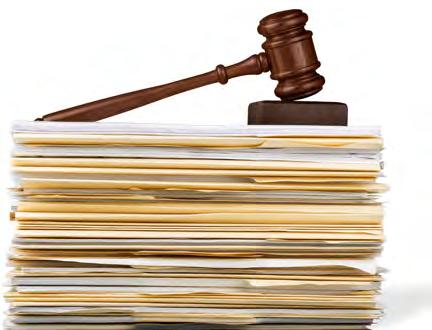
Motion practice is the process of using written requests to help narrow the issues that will ultimately be resolved at trial. Arkansas Code of Civil Procedure 7(b) governs motion practice in state proceedings. According to that Rule, unless made during a hearing, a motion must be in writing and must include a brief supporting statement of the factual and legal basis for the motion. The rule is clear. Here are some practical tips to make the most of motion practice.

Judge Diane Warren serves Washington and Madison Counties handling juvenile, domestic relations and probate cases.
Follow the rule. Whether you think the judge knows the legal basis or not, whether this is a unique request or one you have made numerous times before, it is important to provide to the court the law or rule that gives the court the authority to grant the relief you are requesting. So if, for example, you are asking for an attorney ad litem to be appointed, cite the statute that says under what circumstances an attorney ad litem can be appointed. Then state the facts that support your position that the court should grant the relief you are requesting.
State facts not opinions. The Court’s job is to match facts to law and make factual and legal determinations. The rule for motions is that each paragraph should contain one factual circumstance. Write your motion in that way. You do not need to attach to the facts your client’s interpretation of intent. For example, if the Decree says the parties shall use AppClose to communicate and your allegation is that the opposing party is in contempt for failing to do so, you can and should state that the opposing party has communicated in some way other than AppClose. You need not and should not state in your motion that the opposing party has “petulantly and obnoxiously sent harassing communication” to your client.
Watch the clock! A written motion and notice of the hearing thereon must be served at least 20 days before the time specified for the hearing. At a minimum, the party opposing the motion has 10 business days to file a
response. If you file a motion less than 10 days in advance of a previously scheduled hearing, your motion may not be addressed at or before the hearing because it is not “ripe.” Don’t file a motion three days before a hearing and then call the court the next day to ask if the motion has been granted. The answer, most likely, is no. The judge hasn’t looked at it yet because time to respond has not expired. Moreover, do not assume the court will continue a previously scheduled hearing so that your newly filed motion may be heard. If you do file a motion within 10 days of a hearing and you know the opposing party does not object to the motion, be sure to include that in your pleading. The court is much more likely to grant you the relief you are seeking if the opposing party does not object.
Use ex parte motions cautiously. An ex parte motion is one in which the party asks the court to order something before giving the opposing party an opportunity to respond. The 5th and 14th Amendments to the U.S. Constitution ensure due process. The rules of civil procedure regulate the
notice to be given in order to provide due process. Not surprisingly, courts grant ex parte motions sparingly. If you do file a motion seeking ex parte relief, be sure it’s verified. Further, the situation must be one where damage or harm is believed to be imminent and/or irreparable such that action must be taken before a hearing can be held. For example, if there is reason to believe that a parent is going to abscond with a child, or if a person is in imminent danger. It’s extremely important that when you file a motion for ex parte relief, you provide the court with the law that allows the court to act and specific facts that explain the situation and the emergency nature thereof. There must be a reason the court needs to act immediately and the issue cannot wait for emergency hearing. Do not overstate your case. If you burn a judge once by claiming the sky is failing and it turns out there’s just a bit of rain, you’re less likely to have your next ex parte motion granted.
Limit disputes over discovery. Discovery is meant to be a tool to share relevant information to help narrow and clarify
the issues. Ask for information you need to move the case forward and provide information that is requested. The Court can tell when you’re playing games by flooding the opposing party with requests for discovery that are not made in good faith. If the parties have been married for five years and the Defendant has worked at a fast-food restaurant for the duration, a discovery request asking the defendant to say where he/she has been employed for the last three years is just not necessary. Ask for information you do not already have and that you need.
Conclusion: Motion practice can be useful to resolve certain issues before trial so the trial itself can address specific issues based on adequate, relevant evidence. Use motion practice to eliminate issues, gather important information and frame the argument for the court. Follow the rules of civil procedure and operate in good faith. ■




By Judge Joe Volpe

Hon. Joe J. Volpe has been a Horse of a Different Color, or United States Magistrate Judge, for the Eastern District of Arkansas for 15 years.
What exactly is a magistrate judge?
I could give a lawyerly answer, but the simplest answer is – a United States Magistrate Judge is a federal trial court judge. The position of magistrate judge was created by congressional action under Article I, whereas district court judges are established by Article III of the U.S. Constitution. Regardless, magistrate judges serve in the United States District Court along with district judges. Magistrate judges go through a merit selection process and are appointed by the district court for eight-year terms, subject to renewal, unlike district judges who receive lifetime tenure.
The position of United States Magistrate Judge finds its roots in the United States commissioner system dating back to 1793. Later, in 1965, Congress examined the commissioner system and enacted legislation to upgrade the position to what is now called “magistrate judge.” As a result, magistrate judges have jurisdiction to hear a wider range of proceedings in civil and criminal cases. In the Eastern District of Arkansas, magistrate judges preside over criminal initial appearances, detention hearings, and arraignments. We also have a busy civil docket that includes many functions to assist the district judges with pretrial matters. With the consent of the parties, we preside over civil jury trials.
Why should I consent to have a magistrate judge preside over my case?
In every civil case filed in the Eastern or Western Districts of Arkansas, parties are notified of the Magistrate Judge Consent Program. By consenting to magistrate judge jurisdiction, the parties agree to proceed with a magistrate judge. Statistics show that most Arkansas lawyers do not consent. In my opinion, this is an opportunity missed. Magistrate judges have much more flexibility in setting your case, so generally you can try the case whenever you want. Your case will also likely be resolved sooner with a magistrate judge. District judges do not have the same flexibility to set cases because they must prioritize felony criminal cases on their dockets given the strict requirements of the Speedy Trial Act. And remember, while the Clerk’s Office sends out the consent forms soon after the case is filed, the parties may consent to magistrate judge jurisdiction at any time before trial. So, by consenting, you can have your case heard sooner and most likely when you want.
How do I answer to my client if the magistrate judge issues an adverse ruling?
One reason for not consenting cited by lawyers is the potential risk of having to answer to a client upset by the magistrate judge granting summary judgment. They say, “if the district judge grants summary judgment, that judge was drawn randomly and there will be no confrontation with the client.” My response to this concern is that magistrate judges are also randomly drawn and partnered with a district judge in every case. So, in other words, lawyers are just going to a second bank of randomly selected trial judges to resolve the case. Again, given the expedience and convenience, I submit consenting is a good
option to save the client time and money. Also, being before a magistrate judge is no different than being before any other trial judge. While all judges are different, they all decide cases on the facts and the law. If you suffer an adverse ruling, you may always take the matter up on appeal. And if your case goes to a jury trial, it will be a jury who decides the fate of your client. Early in my career I clerked for Magistrate Judge John Forster. Some parties consented to him presiding over their jury trial and, afterwards, I remember the lawyers remarking that they should consent more often because Judge Forster “ran a tight trial.” Like Judge Forster, magistrate judges in Arkansas are experienced trial lawyers. And there is no more conscientious and professional group of judges than the magistrate judges of the Eastern and Western Districts of Arkansas.
How else can magistrate judges help in civil matters?
Magistrate judges have the unique responsibility of serving as mediators for civil matters pending before the federal court. If you have a case pending in federal court, you may request that the presiding judge refer it for mediation. Your case will be assigned to the magistrate judge already associated with your matter and the magistrate judge will work to settle it at no cost to the parties. Magistrate judges in the Eastern and Western Districts are experienced mediators who work hard to get you results.
What felony criminal matters do magistrate judges hear?
In the Eastern District of Arkansas, magistrate judges serve as “duty judges” for month-long periods. Magistrate judges in the Western district are assigned criminal cases according to the division of filing the criminal case. During the duty month, magistrate judges are available 24/7 to issue arrest and search warrants, criminal complaints, and hold initial appearances and arraignments for defendants charged with violating the laws of the United States. In fact, among other things, I have been regularly called out of bed to drive bleary eyed to the courthouse in the middle of the night, reviewed and signed documents

on the hood of my truck, and met agents and assistant U.S. Attorneys in very strange locations for urgent matters during my criminal month. I have heard it correctly said, “You can always count on a magistrate judge being available any time of any day.” While our duties are primarily designed for those agents and federal prosecutors, we are also available to assist with any other urgent criminal matters that may arise for defense attorneys. We routinely get calls from defense lawyers needing to know where their client is being held, or needing help with arranging a first appearance for a client arrested over a weekend or holiday. It is our duty to be available, and we are glad to do it.
What other criminal cases are decided by magistrate judges?
18 U.S.C. § 3401 generally confers jurisdiction of misdemeanors and petty offenses to magistrate judges. These are often offenses committed on federal property like the Greers Ferry Project, Arkansas Post, Buffalo National River, and the Hot Springs National Park, etc. Hot Springs, in the Western District of Arkansas, boasts a robust court because it also serves as a training ground for new park rangers. Presently, Magistrate Judge Mark Ford from Fort Smith presides over court in Hot Springs monthly. I have had the honor of covering for the Western District judges when they are otherwise occupied. The Eastern District of Arkansas holds court quarterly and I share this duty with Judge Benecia Moore. These federal cases can be as simple as parking tickets and as complicated as violations of the Archeological Resources Protection Act. They can also include
cases arising from the Federal Correctional Institution at Forrest City, Arkansas, where federal inmates are caught with contraband like a cellular phone or tobacco – each a misdemeanor violation. Some of these cases go to bench trial, but most violators pay their fines.
Is it proper to refer to “magistrates” or “magistrate court”?
Often, we are incorrectly referred to as magistrates. There is no such thing as a magistrate in the federal system. Our former title “magistrate” was used until 1990 when 28 U.S.C. § 631, the statute creating our position, was amended. Pursuant to the Judicial Improvements Act of 1990, Section 321, Pub. L. 101-650, 104 Stat. 5122, Congress changed our title stating: “After the enactment of this Act (December 1, 1990), each United States magistrate appointed under section 631 of title 28, United States Code, shall be known as a United States magistrate judge…” And Congress has amended federal statutes to conform and used the term “United States Magistrate Judge.” Similarly, the Supreme Court has amended both the Federal Rules of Civil Procedure and the Federal Rules of Criminal Procedure to use the term “magistrate judge.” 28 U.S.C. § 451 states, “[J]udge of the United States” includes judges of the courts of appeal, district courts …” etc. The New York Times, the Chicago Manual of Style, and other style books have also been changed to reflect the full and correct title. So, as I tell people, I know you want to be correct—the correct title is magistrate judge. Likewise, there is no such thing as “magistrate court.” The court is correctly called district court. ■
by Judge Leon Holmes


Leon Holmes is a former federal judge, serving on the U.S. District Court for the Eastern District of Arkansas.
Speak the truth: that is the first principle of effective advocacy. A lawyer engaged as an advocate must find some truth that can form the centerpiece of a theory of the case which, given the facts and the law, has the potential to yield the best attainable result for the client. That truth might be a fact or set of facts, a legal principle, a procedural point, a period of limitations, an interpretation of case law, or some combination of those things. That truth is the pearl of great price, the treasure buried in a field, for which the lawyer must search by investigating the facts and researching the law. Of course, methods and techniques of presentation have an important place in advocacy; but the methods and techniques of presentation, whether oral or written, are secondary to this first principle: speak the truth.
The alternative is to ascertain what positions, if adopted by the court or jury, would yield the result that the client desires and then to search for arguments that support those positions. No doubt, this alternative is often adopted by lawyers; but, even aside from the moral ambiguities inherent in this approach to advocacy, it is not the approach that is most likely to persuade the court or jury. Speaking the truth—the truth that has the potential to yield the best result for the client possible given the facts and applicable law—is not only the right thing to do, it is also more effective. That approach is more likely to persuade the court or the jury.
If speaking the truth is the first principle of effective advocacy, conviction is advocacy’s most important ingredient. Again, while a good advocate will use methods and techniques of persuasion, no method or technique will make the argument as convincing as will conviction. The advocate who wants to convince must speak with conviction. The advocate who is speaking the truth, and knows it, will speak with more conviction than the advocate who has adopted a position and then searched for arguments to support that position.
Every lawyer has been taught the importance of candor. That speaking the truth is necessary for candor is self-evident. Adopting positions and then searching for arguments to support those positions tempts the advocate to a lack of candor. Persuasion depends not only on the points for which the advocate argues, but also on the points that the advocate is willing to concede. The advocate who speaks the truth ipso facto will have the candor to concede points on which the opponent is correct. The advocate who adopts positions favorable to the client and then searches for arguments to support those positions will find it more difficult to concede points that should be conceded.
Finding the truth that can form the centerpiece of a theory of the case, rather than adopting positions and then searching for arguments, has a further consequence, namely, that it produces a more focused and more concise argument. In the vast
majority of cases, the decisive issues are very few; usually, no more than two or three. Adopting positions and then searching for supporting arguments is an approach that lends itself to contesting every possible point. A complaint with nine or ten counts, or a brief arguing nine or ten issues, usually results from one of two causes: either the lawyer is arguing points that are not decisive (which distracts the decisionmaker from the issues on which the case turns); or the arguments on some points lack merit; or both. But the lawyer who speaks the truth as the centerpiece of a theory of the case which, given the facts and the law, has the potential to yield the best attainable result not only will be more candid, but that lawyer also will focus the argument on the decisive issues. Such a lawyer is less likely to argue points on which the case does not turn or to argue positions that lack merit. It follows from what has been said that speaking the truth which, given the facts and the law, might yield the best
conviction. But that credibility also flows from the fact that the advocate focuses the argument on decisive issues and does not assert arguments on multiple points that are not decisive or as to which the arguments lack merit. Credibility is gold for an advocate; without it, the advocate is destitute. Credibility and speaking the truth, needless to say, go hand in hand. It also follows that speaking the truth which, given the facts and the law, might yield the best attainable result leads to greater clarity. At a minimum, that approach makes clear what are the decisive points; it focuses the court or jury on the centerpiece of the advocate’s theory of the case rather than on peripheral or secondary issues. More than that, the advocate who is speaking the truth will strive to make clear what that truth is and why it is true. If only the judge or jury understands, the advocate will think, they will be persuaded; which focuses the advocate on clarity. Too often, lawyers (and, I should add, judges) fail to make
advocacy; clarity is its best friend. Taking positions and then searching for supportive arguments is more likely to produce confusion than is speaking the truth; speaking the truth is more likely to produce clarity.
In summary, speaking the truth is not only the right approach, morally and ethically, but also the approach to advocacy that is most likely to be persuasive. It results in the five C’s of effective advocacy: Candor, Conviction, Conciseness, Credibility, and Clarity. ■
©2024. Published in Appellate Practice Section, March 14, 2024 by the American Bar Association. Reproduced with permission. All rights reserved. This information or any portion thereof may not be copied or disseminated in any form or by any means or stored in an electronic database or retrieval system without the express written consent of the American Bar Association or the copyright holder.

425
Benefactors
John D. Alford
Kelsey Kaylyn Bardwell
James D. Bornhoft
Andrew L. Caldwell
Thomas M. Carpenter
Judge Susan Webber Wright
Carter
Earl Buddy Chadick
Suzanne G. Clark
Randy Coleman
Steven A. Cosse
Danny R. Crabtree
Tim J. Cullen
Steven B. Davis
Jack W. Dickerson
Brad G. Dowler
Elizabeth Ann Andreoli
Kenneth B. Baim
David L. Beatty
Kandice A. Bell
Paul B. Benham, III
Stephen Bennett
Allen W. Bird, II
Samuel N. Bird
Daniel C. Blaney
Thomas William “Will” Bond
Hon. Laurie Bridewell
Fred E. Briner
Bill W. Bristow
J. Paul Byrd
Benefactors are members who make a sustaining contribution of $250/year in addition to membership dues to support Association programs.
Bob Edwards
Bob Estes
Buck C. Gibson
Hon. Donald Goodner
Judge David F. Guthrie
R. Victor Harper
Joseph Hickey
Philip Hicky, II
Denise Reid Hoggard
Glen Hoggard
Rebecca B. Hurst
Paul W. Keith
William H. Kennedy, III
Judson C. Kidd
Andrew F. Kirkendall
Donald E. Knapp, Jr.
Joseph F. Kolb
Howard Baker Kurrus
Charles Knox Lincoln, II
Dustin B. McDaniel
Jerald Cliff McKinney, II
Michael W. Mitchell
Brandon K. Moffitt
Margaret Woodward Molleston
Rosalind M. Mouser
Alan J. Nussbaum
Debby Thetford Nye
Richard C. Ourand, Jr.
William L. Owen
Kristin L. Pawlik
Richard Martin Pence
Joshua L. Potter
Brian M. Rosenthal
Judge John R. Scott
Ted C. Skokos
James W. Smith
Greg A. Thurman
Richard Edwin Ulmer
Matthew Vandiver
William A. Waddell, Jr.
Eddie H. Walker, Jr.
Judge Gordon Webb
Daniel A. Webb
Kandy Gregg Webb
Rufus E. Wolff
Patrons are members who make a sustaining contribution of $100/year in addition to membership dues to support Association programs.
Hon. Ted C. Capeheart
Mitch Cash
Erin E. Cassinelli
Christopher Chad Causey
Stuart A. Cearley
Robert M. Cearley, Jr.
Hon Charles E. Clawson, Jr.
Barry E. Coplin
James O. Cox
John Atkins Crain
Junius Bracy Cross, Jr.
Hon. Elizabeth Danielson
Charles D. Davidson, Sr.
Judge Robert T. Dawson
Judge Beth M. Deere
Terry Dugger
Katelyn Marie Eaves
Don A. Eilbott
Hon. Audrey Riemer Evans
Judge David Folsom
Lyle D. Foster
Barry Lee Frager
Amy Freedman
Dr. William Andrew Fulkerson, III
Price C. Gardner
Charles C. Gibson, III
Pamela B. Gibson
Sam E. Gibson
Greg R. Giles
John P. Gill
Dent Gitchel
Morton Gitelman
Judge Don E. Glover
Dorsey D. Glover
Michael R. Gott
Ronald L. Griggs
Barbara B. Halsey
Audra Katharine Hamilton
David Michael Hargis
Richard F. Hatfield
Anthony A. Hilliard
Curtis E. Hogue
Brian C. Hogue
Robert Howard Hopkins, Sr.
Q. Byrum Hurst, Jr.
James W. Hyden
Michael E. Irwin
Larry Russell Jennings
Judith M. Johnson
Jim Julian
Sean T. Keith
Donald H. Kidd
Rebecca Langston
Stark Ligon
Judge John R. Lineberger
Gabriel D. Mallard
William C. Mann, III
Chief Judge D. Price Marshall, Jr.
Richard Hartley Mays


Anthony L. McMullen
Hon. Michael J. Medlock
Philip Miron
Judge Chalk S. Mitchell
T. Ark Monroe, III
Harry Truman Moore
Hon. Amy Dunn Moore
Wm. Kirby Mouser
Stephen B. Niswanger
Brianna Spinks Nony
Edward T. Oglesby
Judge James E. O’Hern, III
Chad R. Oldham
Neal R. Pendergraft
Brant Perkins
Ellis Lamar Pettus
Donna C. Pettus
Melody H. Piazza
Judge Joseph Ramos
Brian H. Ratcliff
Robert Jeffrey Reynerson
Judge Curtis E. Rickard
Lewis E. Ritchey
John Boyd Robbins
William S. Robinson
Richard L. Roper
Thomas N. Rose
Angela Galvis Schnuerle
John S. Selig
Stephen M. Sharum
Ronald L. Sheffield
Harry E. Skinner
Raymond C. Smith
T. Benton Smith, Jr.
Michael W. Spades, Jr.
Aaron L. Squyres
Annabelle Imber Tuck
James R. Van Dover, Sr.
Danyelle J. Walker
Chris Walthall
Judge Diane Bartsch Warren
Lt. Col. Stan L. Warrick
Mercedes L. Watson
John Dewey Watson
Daniel A. Webb
Rep. David J. Whitaker
David W. Whitehurst
Judge Billy Roy Wilson
Hon. Ralph Edwin Wilson, Jr.
George R. Wise
Tom D. Womack
Megan Elizabeth Wooster
Wm. Randal Wright
Cary E. Young


Presented Jointly by the Arkansas Bar Foundation and the Arkansas Bar Association





Outstanding Lawyer Award
William M. Griffin III Friday, Eldredge & Clark, LLP
Little Rock

C. E. Ransick Award of Excellence
Philip C. Wilson Office of the Public Defender Malvern

Outstanding LawyerHumanitarian Award
Elaine Kneebone Attorney at Law Arkadelphia

Equal Justice Distinguished Service Award
Annie Smith Professor of Law University of Arkansas School of Law
Outstanding Lawyer-Citizen Award
Richard Donovan Rose Law Firm Little Rock
James McKenzie Professionalism Award
George R. Rhoads (Posthumous)
Outstanding Jurist Award
Judge Cindy G. Thyer Arkansas Court of Appeals
Outstanding Local Bar Associations:
Pulaski County Bar Association
Sebastian County Bar Association
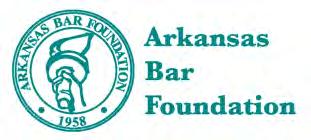
MeMorIals and honorarIa
The Arkansas Bar Foundation acknowledges with grateful appreciation the receipt of the following memorial, honoraria and scholarship contributions received during the period February 1, 2025 through April 30, 2025.
In MeMory of Terry KIrKpaTrIcK GuzMan
Barbara and B. Jeffery Pence
In MeMory of JudGe Jerry MazzanTI
Judge Bentley E. Story
In MeMory of JudGe WIllIaM palMa “pal” raIney
Nancy and Judge John N. Fogleman (ret.)
In MeMory of Governor JIM Guy TucKer B. Jeffery Pence
In MeMory of rIchard WesT
Nancy and Judge John N. Fogleman (ret.) scholarshIp conTrIbuTIons
andree layTon roaf scholarshIp
The Rt. Rev. Phoebe A. Roaf
sebasTIan counTy bar assocIaTIon scholarshIp
Sebastian County Bar Association
A gift was given In Honor of Judge Cindy G. Thyer From The Halsey Family to commemorate her achievement as the 2025 Outstanding Jurist Award recipient
P.O. Box 7297, Little Rock, Arkansas 72217
www.arkansasbarfoundation.com
Friday evening, April 11, 2025, was a lovely gathering of attorneys and guests from throughout the state for the 2025 Annual Fellows’ Dinner hosted at Next Level Events in Little Rock. The evening began with an opening reception of enjoyable fellowship among guests, followed by dinner. The Foundation program highlighted the mission and good works accomplished throughout the year and recognition of new Fellows, Donors, Sustaining Fellows, and Scholarship contributors. The Foundation was pleased to recognize all firms or individuals present who had a naming opportunity at a former bar center with a special plaque that was presented during the program. The evening culminated with the celebration of the 2025 Annual Awards, presented jointly by the Arkansas Bar Foundation and Arkansas Bar Association. Photo credit: Mike Pirnique Congratulations to the 2025 Annual Award recipients listed on the opposite page. It was an honor to recognize your achievements.

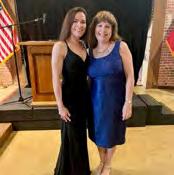
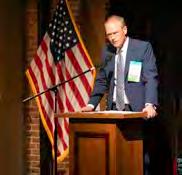

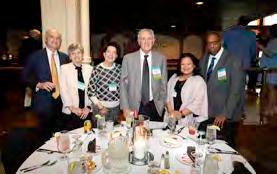







Arkansas Bar Foundation Annual Membership Meeting Monday, June 9, 2025 at 1:30 pm via Zoom
Foundation Members: Details were mailed to you on May 1, 2025. Board of Directors’ Meeting will immediately follow.

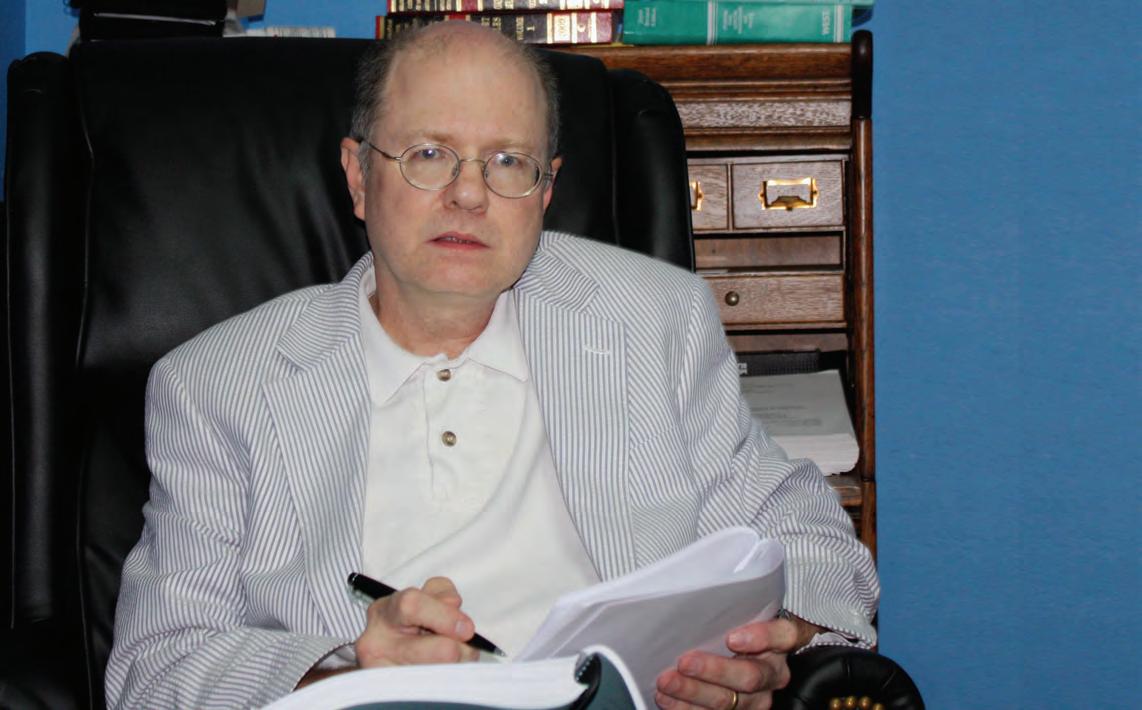
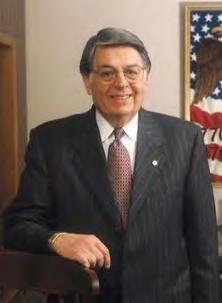
Lewis E. Epley Jr. of Fayetteville died March 19, 2025, at the age of 88. Lewis E. Epley Jr. is remembered as a pillar of his community— known for his leadership, generosity, and dedication to public service. A graduate of the University of Arkansas and the UA School of Law, he was admitted to practice in 1961 and opened a solo practice in Eureka Springs. For 25 years, he worked alongside his brother, Alan. Lewis also founded an abstract and title company and served one term as City Attorney. A lifelong public servant, he represented Carroll and Madison Counties at the Arkansas Constitutional Convention and served as legal counsel for the Carroll-Boone Water District, helping to develop critical water infrastructure. His legacy includes decades of service to healthcare, education, and the Razorback Bands, where his impact will be long felt.

Benjamin Clark McMinn of Little Rock died April 26, 2025. A graduate of Little Rock Central High School, Class of 1956, Ben earned his undergraduate degree from Tulane University in 1960, including a summer of study at the University of Guanajuato in Mexico. His pursuit of global education continued in Madrid, Spain, at the University of Madrid. After working in banking and construction, Ben earned his J.D. from the University of Arkansas School of Law in Fayetteville in 1968. He practiced law for more than 50 years. His passion for learning led him to study Japanese at Kansai University of Foreign Studies in Japan, and later, Russian at the Pushkin Institute in Moscow. After age 60, he traveled extensively, teaching English in Russia and Bulgaria. Ben’s life was marked by curiosity, service, and a commitment to cross-cultural understanding.

John Parrish Neihouse of Springdale died February 22, 2025, at the age of 62. John earned his bachelor’s degree in accounting from Arkansas Tech University and began his career in Fort Smith as a CPA. After graduating from the UALR School of Law—where he was a member of the Law Journal—he went on to earn an advanced LL.M. in taxation and estate planning from Southern Methodist University. John practiced law in Dallas before returning to Arkansas in 1990. Since 2010, he was a partner at RMP in Springdale, where he was widely regarded as an elite practitioner in his field. His blend of legal acumen and accounting expertise earned him deep respect among his peers and clients.

Judge William Palma “Pal” Rainey of West Memphis died March 2, 2025, with his sons by his side. Known for his fierce dedication to justice and his largerthan-life personality, Pal’s legal career spanned more than 50 years and left a lasting imprint on the legal community of eastern Arkansas. He earned his B.S. from the University of Arkansas in 1969 and his J.D. in 1972. Admitted to the Arkansas Bar in 1973, Pal practiced law with tireless devotion, often working seven days a week on behalf of his clients. Pal served as Juvenile Court Judge in Crittenden County from 1975 to 1979 and was elected Municipal Court Judge in 1987, serving until his retirement in 2012. He was widely known for his sharp wit, fiery demeanor, and unfiltered candor, which made him both a formidable presence in the courtroom and a beloved local figure. His courtroom tales, often featured in The Evening Times, reflected his unique blend of humor, passion, and principled judgment.

Thomas S. Stone of Pine Bluff died January 16, 2025, at the age of 82. Tom was a proud graduate of the University of Arkansas and the University of Arkansas School of Law. He served aboard the USS Canberra and the USS Long Beach during the Vietnam Conflict, demonstrating a deep sense of duty to his country. Following his military service, he practiced law for more than 50 years, earning respect from colleagues and clients alike.

Richard Ray West, Sr., of Marion died March 26, 2025. Richard dedicated his life to serving both his country and his community. After earning his bachelor’s degree in 1984, Richard pursued his J.D. at the University of Arkansas School of Law, graduating in 1987. He went on to serve in the United States Air Force Judge Advocate General’s Corps, where he was stationed in Fort Worth, Texas. Rising to the rank of Major, Richard provided steadfast legal support to fellow service members with integrity and dedication. He founded a private law practice in Marion and became a fierce advocate for clients throughout Crittenden County. In addition to his practice, Richard served as a public defender, committed to ensuring that all individuals—regardless of circumstance— received fair and competent legal representation.
Information has been gathered from published obituaries of our members.









